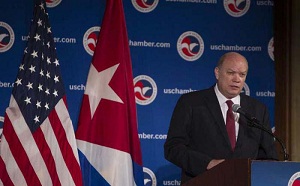 In early October 1977, some 70 U.S. businesspeople gathered in Washington to demand the lifting of the blockade against Cuba. The meeting had an unusual guest, the then Minister of Foreign Trade of the island, Marcelo Fernández Font.
In early October 1977, some 70 U.S. businesspeople gathered in Washington to demand the lifting of the blockade against Cuba. The meeting had an unusual guest, the then Minister of Foreign Trade of the island, Marcelo Fernández Font.
Theatmosphere was favorable. A thawin relations betweenthe James Carter administration and Havana had begun, and that same yearinterest officeswere openedin both capitals.Travelto Cubaby U.S. citizenswas fully authorized, although this onlylasted a shortperiod.
Jonathan Bingham, a State Department official present at the meeting, described the blockade as “an anachronism” and stated that it should be eliminated without preconditions.
Meanwhile, the Cuban Minister gave a talk about the Cuban economy, its progress and development prospects.
He assured that Cuba was interested in developing trade and economic relations with the United States, but under conditions of equality and mutual benefit, without any restrictions or discriminatory barriers.
This Tuesday, February 16, another Cuban Foreign Trade Minister was in the U.S. capital, this time as an official guest, following the reestablishment of diplomatic relations.
Nearly four decades later, the debate took place almost in the same terms.
The influential Chamber of Commerce of the United States, the largest institution of its kind in the world, organized a meeting with a broad group of businesspeople who support increasing ties with Cuba.
The numerous accredited press there to cover the event, showed great interest in the presence of the Cuban delegation headed by Malmierca, which included officials from Cuba’s Ministry for Foreign Trade and Investment, the Foreign Ministry, the Central Bank of Cuba and the Chamber of Commerce of the island, as well as executives of Cuban entities and members of the Cuban diplomatic corps.
“This is a historic day,” Cuban Ambassador to the U.S. José Ramón Cabañas said during his speech at the working lunch that followed the brief private meeting.
“In recent months this word has been used a lot,” he acknowledged, but added that it was hard not to describe a day in which the visit of a Cuban minister to Washington and the presence in Havana of the U.S. Secretary of Transportation to sign an agreement on direct flights, had coincided in this way.
Earlier, Executive Vice President and Head of International Affairs at the U.S. Chamber of Commerce, Myron Brilliant, repeated her position, held for more than 15 years, to lift the blockade and do business with the island; a position which has gained strength following the announcements of December 17, 2014.
Carlos Gutiérrez, former U.S. secretary of commerce, who assumed the presidency of the U.S.-Cuba Business Council, called on businesses to act.
“We are asking companies, if they wish to be in Cuba, to get involved in the political issue to demand that the sanctions are removed,” he told reporters after concluding his official speech.
“The more investments are made and the more transactions are approved, the harder it will be to reverse this process. It would be very difficult for someone to come and say: this is over.”
Gutiérrez is now one of the most influential advocates within his party for a change of policy toward the island and is convinced of the inevitability of the end of the blockade.
Responding to a question from Granma during the press conference, the Vice President of the Americas for the International Division of the U.S. Chamber of Commerce, Jodi Bond, recalled some of the obstacles that remain.
“I recognize how little U.S. lawmakers know about the changing reality of Cuba,” she said.
She added that efforts must be focused toward educating them on the prevailing view of the U.S. population and companies, who are calling for an end to the sanctions.
Meanwhile, Malmierca, the first senior Cuban official to speak at the U.S. Chamber of Commerce in more than a half century, noted, “You are welcome to do business in Cuba.”
Cuba will treat U.S. companies in the same way as those from the rest of the world, he said during the press conference. “We will not discriminate, nor make the process more complicated for you.”
Malmierca explained that foreign investment is key to the island’s development plans, with hopes that Cuba will receive two billion dollars in investment annually.
“How much of that money could come from the United States?” asked a U.S. journalist.
That depends: it could be all of it or it could be nothing at all, the Cuban Minister stated, noting that “The blockade is the main obstacle.”
(Granma)